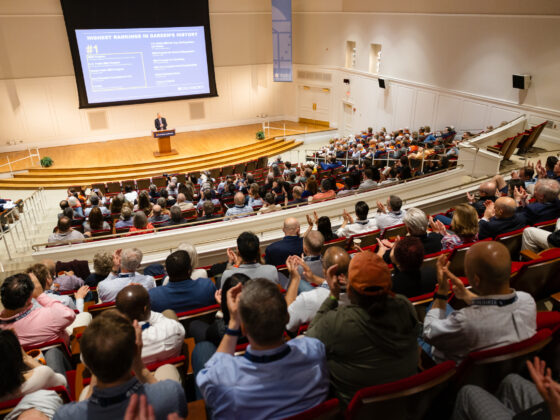As close readers of our website know, during their 21-months of study, Executive MBA students take a required core curriculum and a minimum of twelve (12) electives.
Electives are offered primarily in the second year of the program, and students choose from a slate of electives specifically offered for Executive MBA students. Each year, the Executive MBA program team works closely with students and faculty to determine the elective offerings, and consistent with Darden’s general management orientation, electives typically touch upon a broad range of topics including strategy, leadership, finance, marketing, entrepreneurship, ethics and more.
While the Executive MBA program has not previously offered specializations or concentrations, earlier this month, the Executive MBA program team announced the introduction of seven new Focus Areas:
- Data Analytics & Technology
- Entrepreneurship
- ESG & Social Impact
- Finance
- Leadership
- Marketing
- Strategy
It is worth noting that students still have significant flexibility when choosing electives, and they are not required to specialize in a specific Focus Area at any point during their course of study. However, for students who wish to take a deeper dive into a particular topic or topics, the Focus Areas represent an opportunity for personalization.
A few more things to know: To earn a Focus Area, students must take three (3) electives from a predetermined and approved course list. Students can earn more than one Focus Area, and as soon as the student meets the requirements for the Focus Area, they automatically receive a letter from the Registrar indicating they have earned that Focus Area. They may include this information on their resume, LinkedIn, etc.
Lastly, the Focus Areas are not set in stone, the program team plans to reevaluate the offerings every couple of years to ensure alignment with market trends.
We recently caught up with Senior Associate Dean Yael Grushka-Cockayne to discuss the Focus Areas, the inspiration for the idea, how this offering aligns with the Executive MBA curriculum and more.
Q: Where did the inspiration for the Focus Areas come from?
A: It’s actually a conversation that has been ongoing within the Executive MBA program for some time. However, it was brought to the fore again by a few of our current students. Their energy around this conversation was absolutely integral to our efforts. They did an incredible job helping us understand the market landscape as well as current student interest and demand for these kinds of offerings.
One of the things I love about leading the Executive MBA program is that our smaller size (roughly 270-280 students in total, across the two classes combined) allows us to be nimble. We are always listening to our students, and we absolutely view them as partners in this enterprise. They are a constant source of great ideas, and the Focus Areas are just the latest in a long line of examples of the impact students have had on this program.
Q: How did the program develop the areas?
A: It was a multi-pronged approach, and it involved a number of stakeholders. Of course, we started with our students, and they had ideas about what might be popular with their classmates.
We consulted with the faculty regarding their current and future class offerings, as well as their thoughts on grouping the electives into areas. We also talked with our Admissions colleagues about what they were hearing from prospective students.
In addition, we know students are often thinking about these kinds of things as a way to signal an interest or expertise to potential employers, so we also included our Career team in the conversation. In addition, we looked at our current elective offerings and tried to get a sense of how we might organize the current courses into broader categories. Lastly, we also weighed current business trends and emerging areas of opportunity for MBA graduates.
Through this integrative process we worked through a series of drafts and eventually developed consensus around seven areas. Of course, we plan to revisit the Focus Areas every couple of years, and, to me, it will be interesting to see what’s popular with students and how these offerings evolve.
Q: How do you think these areas fit into the overall experience for Executive MBA students?
A: In my opinion, the Focus Areas offer students even more opportunity for personalization, which is directly in line with Darden’s student-centered learning model.
Of course, students are not required to focus or specialize during their time in the program, but, if a student really wants to take a deeper dive into an area, they now have the option to do so, and, perhaps most importantly, to receive recognition that they have earned a Focus Area. That becomes something they can put on their resume, LinkedIn, share with their employer, etc.
We know many of our students come to the program to facilitate a career transition, and, over the past few years, we have spent a lot of time building out the career resources and support available to Executive MBA students. If these Focus Areas can be helpful to students as they build their career narratives and engage with employers, that’s also a win.
From an academic standpoint, I think these Focus Areas represent topics where we have curricular depth, so for a student whose interests align with this list, know that you would be able to pursue that interest here. However, it is also worth noting that the elective offerings in the Executive MBA program are quite broad, and prospective students should know that while we have these focus areas, they don’t capture the full range of our electives. There is a lot more that is possible than even what is reflected in this group.
And, as with the current set of Focus Areas, we expect that students will continue to help us think about hot topics and emerging areas we can incorporate into our curriculum. As a program, we are always looking for ways to improve and keep things moving forward. In the past two years alone, we have expanded the global residency locations, formalized our co-curricular offerings, revamped the experiential learning curriculum and increased the total elective count to 12. To me, the introduction of the Focus Areas is just one more example of this constant iteration, and I’m excited to make them available to students.
Be sure to consult the Latest News regularly for the most updated news releases and media hits. Check out faculty thought leadership published on Ideas to Action. And stay connected with us via social media: Facebook, Instagram, LinkedIn, Twitter, WeChat.





